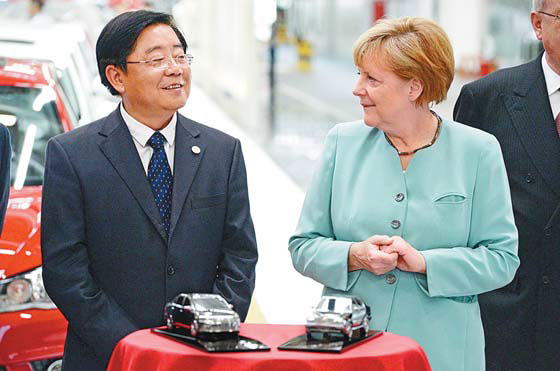Volkswagen puts its foot on the pedal
Updated: 2014-07-18 08:27
By Qiu Bo (China Daily Europe)
|
|||||||||||
|
German Chancellor Angela Merkel with FAW Group CEO Xu Jianyi during her visit to the FAW-Volkswagen plant in Chengdu on July 6. Provided to China Daily |
FAW-Volkswagen, the German auto giant's joint venture, is moving up a gear in its expansion in Chengdu.
The company's Chengdu factory expects to deliver more than 600,000 vehicles this year, says Li Hua, deputy director of the Economic and Technological Development Zone of Chengdu, capital of Sichuan province.
The German joint venture has invested more than 17 billion yuan ($2.7 billion; 2.03 billion euros) in Chengdu since 2009, and there could be an additional 3 billion yuan by the end of this year, Li says.
FAW-Volkswagen is seen by many people as essential to Chengdu's automotive industry and the city's economic development.
Last year, the Chengdu factory produced 480,000 vehicles, about a third of the joint venture's annual production in China.
That accounts for about 60 percent of Chengdu's annual vehicle production, the local authority says.
Thanks to the rapid growth of the joint venture, the area's automotive industry made 732,000 cars last year, almost double the number the year before, and 90 percent of Sichuan's production.
Sales revenue from the economic zone surged to 109.3 billion yuan, 60 percent higher than last year, with tax paid surpassing 25.7 billion yuan.
Sichuan, which is best known for its pandas and cuisine, lost almost its entire automotive industry to Chongqing in 1997, when that city broke away from the province and became China's fourth municipality.
Three years later, the province decided to launch the economic zone in Chengdu's Longquan district. It aims to revitalize manufacturing, particularly in the automotive sector.
In 2009, FAW-Volkswagen was invited to set up its third Chinese whole-vehicle manufacturing plant in Longquan, covering an area of 560,000 square meters, Li says.
The district is 12 kilometers from downtown Chengdu.
Eight German whole-vehicle or auto parts makers, such as FAW-Volkswagen and technology provider Bosch, have set up shop in the zone.
The performance of FAW-Volkswagen's Chengdu factory has made a great contribution to Volkswagen' performance in China this year.
In the first half of the year the German company's two joint ventures, FAW-Volkswagen and Shanghai Volkswagen, have put more than 1.8 million cars on the Chinese market, says Jochem Heizmann, a Volkswagen Group board member and president and CEO of Volkswagen Group China.
The figure represents growth of 17.5 percent over the corresponding period last year, he says.
The Chengdu factory supplies two economy cars, the Sagitar and the Jetta, with prices that make the sedans among the most popular in the local market.
German Chancellor Angela Merkel toured the factory this month on the first leg of her seventh China trip since she took office in 2005.
She said she was impressed with the company's efforts to cut energy consumption by 26 percent and water use by 90 percent by using new technology in the factory's oil and gas workshop.
One of her main interests when she visited was the company's training programs, Heizmann says.
"In China we are creating a lot of jobs that demand highly qualified people."
More than 9,000 people work in the factory, and its presence can indirectly create more than 100,000 jobs, such as for car dealers and their employees, the company says.
"We attach great importance to German business entities and welcome all German businesses," Li Hua says.
The German government ceased direct financial aid to China in 2009, but it started to invest in sustainable industries such as environmental protection and energy efficiency, says Feng Zhongping, vice-president of the China Institutes of Contemporary International Relations.
"That's why they are paying so much attention to the automotive industry in China."
Zhao Junjie, an expert on Europe at the Chinese Academy of Social Sciences, says that several years ago, Japan was the leader in vehicle sales in China, but German cars have overtaken them.
qiubo@chinadaily.com.cn
(China Daily European Weekly 07/18/2014 page21)
Today's Top News
Burning wreckage, bodies scattered after jet downed
US widens sanctions on Russia over Ukraine
Hamas agrees on 5-hr ceasefire
Chinese killed in Moscow metro derailment
Obama vows info co-op to Merkel
Filipinos flee as typhoon hits coast
China ends drilling operations in South China Sea
Economic ties with Latin America grow
Hot Topics
Lunar probe , China growth forecasts, Emission rules get tougher, China seen through 'colored lens', International board,
Editor's Picks

|

|

|

|

|

|






